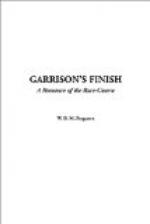They rode a furlong in absolute silence. Again the girl was the first to speak. “It is queer,” she moralized, “how fate weaves our lives. They run along in threads, are interwoven for a time with others, dropped, and then interwoven again. And what a pattern they make!”
“Meaning?” he asked absently.
She tapped her lips with the palm of her little gauntlet.
“That I think you are absurd.”
“I?” He started. “How? Why? I don’t understand. What have I done now?”
“Nothing. That’s just it.”
“I don’t understand.”
“No? Um-m-m, of course it is your secret. I am not trying to force a confidence. You have your own reasons for not wishing your uncle and aunt to know. But I never believed that Garrison threw the Carter Handicap. Never, never, never. I—I thought you could trust me. That is all.”
“I don’t understand a word—not a syllable,” said Garrison restlessly. “What is it all about?”
The girl laughed, shrugging her shoulders. “Oh, nothing at all. The return of a prodigal. Only I have a good memory for faces. You have changed, but not very much. I only had to see you ride to be certain. But I suspected from the start. You see, I admit frankly that you once were my hero. There is only one Billy Garrison.”
“I don’t see the moral to the parable.” He shook his head hopelessly.
“No?” She flushed and bit her lip. “William C. Dagget, you’re Billy Garrison, and you know it!” she said sharply, turning and facing him. “Don’t try to deny it. You are, are, are! I know it. You took that name because you didn’t wish your relatives to know who you were. Why don’t you ’fess up? What is the use of concealing it? You’ve nothing to be ashamed of. You should be proud of your record. I’m proud of it. Proud—that—that—well, that I rode a race with you to-day. You’re hiding your identity; afraid of what your uncle and aunt might say—afraid of that Carter Handicap affair. As if we didn’t know you always rode as straight as a string.” Her cheeks were flushed, her eyes flashing.
Garrison eyed her steadily. His face was white, his breath coming hot and hard. Something was beating—beating in his brain as if striving to jam through. Finally he shook his head.
“No, you’re wrong. It’s a case of mistaken identity. I am not Garrison.”
Her gray eyes bored into his. “You really mean that—Billy?”
“I do.”
“On your word of honor? By everything you hold most sacred? Take your time in answering.”
“It wouldn’t matter if I waited till the resurrection. I can’t change myself. I’m not Garrison. Faith of a gentleman, I’m not. Honestly, Sue.” He laughed a little nervously.
Again her gray eyes searched his. She sighed. “Of course I take your word.”
She fumbled in her bosom and brought forth a piece of paper, carefully smoothing out its crumpled surface. Without a word she handed it to Garrison, and he spread it out on his filly’s mane. It was a photograph of a jockey—Billy Garrison. The face was more youthful, care-free. Otherwise it was a fair likeness.




